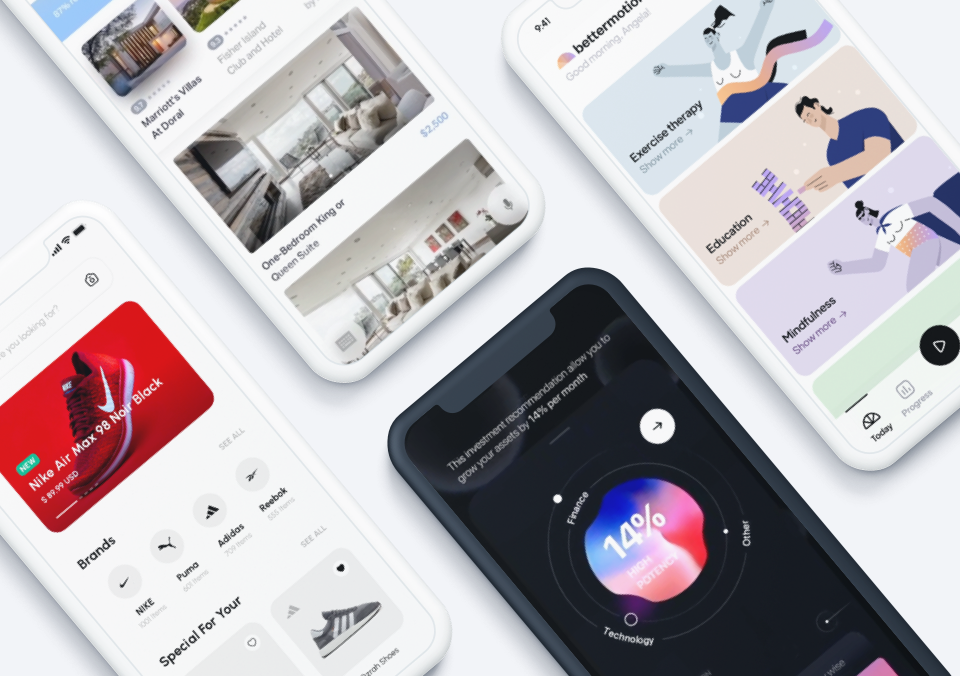For far too many developers, just keeping up with the pace of the industry is a full-time job. They spend so much time scrambling for gigs, racing to catch up with deadlines, or wading through dysfunctional corporate environments that can make it easy to lose track of their goals.
Slowly, over time, and perhaps without anyone even noticing, that dream of creating the perfect app — or landing the perfect development gig — fades into the distance.
Whether you’re feeling stalled in your career, or you’re a newcomer looking for tips to build a successful future as a mobile app developer, here’s what you need to know to transition from surviving to thriving.
What Exactly Is a Successful Mobile Developer?
One of the most appealing things about becoming a mobile app developer is the flexibility it gives you.
Do you prefer to work on your own? There are plenty of great independent app developers who’ve made it. Dream of starting your own company? You can assemble a lean shop and start building great things. Prefer a more traditional work environment? There are plenty of more established software companies where you can work as part of a team.

But with all that freedom comes a lot of stress and insecurity — especially when you’re struggling to get established. There are fewer and fewer traditional career paths where you can just put your head down, do your work, and make a good living. While many people still think that’s how the development world works, that simply isn’t the case.
For every mobile app startup that releases a viral success to great fanfare, there are one hundred others that quietly go up in smoke. If you don’t know what you want as a developer, your chances of being one of the few success stories are slim.
It’s time to take a personal inventory:
What made you want to become a mobile app developer?
- Are you here because you’ve always liked coding or because you have a great idea for a product?
- Did you set out to develop apps from day one or did you just drift into the field?
- Try to recapture that feeling you had when you first realized building mobile apps was the right job for you. Analyze exactly what it was in your daily routine that kept that flame going (or, alternatively, that snuffed it out).
- Knowing where your journey began will help you discover where it can lead.
What captures your interest today?
- It’s easy to get stuck in your original conception of the type of app developer you should become and lose track of the ways you’ve grown and changed. Now that you’ve taken an honest look at what motivated you originally, think about what you’re excited about right now.
- Maybe you started off as an IoT developer, as you thought the technology itself was neat. As time passed, you moved over to wearables because you were inspired by how that particular technology could impact lives. Maybe you pivoted to virtual reality after a particular mind-bending experience with a VR headset.
- Or maybe you got into development to build game-changing apps, but later learned how much you liked optimizing application performance or hunting down stubborn bugs. Take a good look at the way you see yourself as a developer — there’s a good chance you’ve changed more than you’ve noticed.
If you could work anywhere, where would it be?
- Imagine you could magically take any role in any company, anywhere in the world. Where would you be and what would you do? Would you be at a tech giant or nimble startup?
- Would you be designing better interfaces for Android business applications? Helping musicians push their creative boundaries by building apps to interface with cutting edge MIDI controllers? Revolutionizing the iTunes store with a wonderfully addictive mobile game?
- Next, think about what that job would involve. What would your day look like? What skills would you use? Who would you be working with, and what would your work environment look like?
- Take some time to imagine your ideal path as vividly as possible. Do some research on that company or watch an interview with the person who has your dream job. Is it still exactly what you want?

Where will you be in five years as a successful app developer?
- Now it’s time to set some goals. They can be optimistic, but they should be achievable. Saying, “In five years, I’ll be a rich and famous game developer” isn’t going to cut it. How much money will it take for you to feel comfortable (or at least, happy with your progress)? How well would you need to be known to feel like you’ve “made it?”
- Along with those goals, think about what you need to get there. What skills do you need to work on? We’re not just talking about coding skills (although those are important). Independent mobile app developers often need to develop a lot of other skills, like pitching, networking, and project management to bring their ideas to life.
Talk to People Who Are Where You Want to Be
One of the great things about the mobile app development industry is the culture of collaboration. There are a lot of very successful people who are happy to discuss how they got where they are. They’re eager to hand out advice and answer questions from students, beginners, and others in the development community.
One great place to start is simply reaching out through public forums and social media channels. You can find a lot of highly skilled professionals sharing wisdom on LinkedIn or Quora. Web developer, software engineer, and consultant Paul Reiber recommends getting granular about it and looking for people who have the same preferences you do.
“It’s much better to think about programmer friends based on how closely they align with you on various preferences in coding style, tool choices, or other dimensions — like, do they build test suites for their APIs before they build the APIs, or do they get their to-do list in the wrong order? Does their documentation read like butter, or make you want to hurl?”
Why should you care whether your programmer friends have the same workflow, preferences, and interests you do? To collaborate, of course!
As Reiber points out, there are many open source projects out there, “and a lot of people who really appreciate any time someone contributes….” And there’s more value to that appreciation than just the good vibes.
Building Your Career Through Collaboration
Volunteering on projects with like-minded developers isn’t just a way to make some connections — it can pave the way to a successful career in mobile app development.

Many employers use tools like GitHub to find developer candidates and screen them for new positions. GitHub not only gives recruiters a way to look for candidates with the right skills for a project, it also helps them evaluate candidates’ coding ability and, in some cases, “seek out tech pros with very specific skills, or who’ve shown an interest in projects that are similar to their company’s work” according to reporter Mark Feffer, who continued
“For example, Casey Kugler, a tech recruiter for the Center for Open Science in Charlottesville, Va., follows users who have engaged with his organization’s repositories or communicated with members of its tech team. Such users, he noted, have demonstrated a direct interest in the Center’s projects.”
As Feffer points out, GitHub works the other way, too. With a little bit of digging, you can find individuals and companies working on projects that you find interesting. Even when users don’t list their employers, looking at the people they follow, coupled with a bit of Googling and/or poking around networking sites like LinkedIn, can usually show you everything you need to know.
Study Where Mobile Developers Succeed — and Where They Fail
An elegant solution always feels obvious after the fact. From Lyft and Uber’s seamless ride-hailing experience to Amazon’s 1-click ordering, once you get used to a system, it’s hard to imagine how you could have done things any other way. Taking a long, hard look at the also-rans and might-have-beens can help you identify the secret ingredients to success.
Depending on your career goals, it may be worth it to look beyond development itself at the other pieces that go into building a successful mobile app or startup.
If you’re interested in gaming for example, what developers started with great concepts but never achieved wide adoption? Were they stretching themselves too thin? Did their competitors have better UX? Stronger marketing? More solid funding? Was the release derailed by bugs and delays?
As you make more industry friends and contacts, use it as an opportunity to find out about failures as well as successes. A lot of developers are hesitant to publicly discuss major project failures, but they all have stories. And once you get to know them, they might share them with you.

Never Stop Learning
Developers burn out. They get stuck doing the same tasks in the same narrow specialization, product after product, year after year, until they lose their passion (or even their livelihood).
While continuing your education is a great way to upgrade your coding skills for your dream job, it’s about much more than that.
It gives you new tools when your old ones get outdated. It provides fresh new approaches when you’re banging your head against a stubborn problem. It can turn your job from an endless slog into an opportunity to explore and enhance your abilities.
And in a world of endlessly accelerating tech cycles, it can mean the difference between thriving and just getting by.
Build Apps Fast and Release Often
Technology moves too fast for perfectionists. While you’re tweaking your app and finding ways to cram in a few more features, someone else will get a barebones version to market. And to be blunt (and a tad obvious), an app that exists is going to get more downloads than one that doesn’t.
Building mobile app prototypes is a key skill for developers, because it allows you to try out ideas quickly, discard the ones that don’t work, and dedicate your time to the ones that do.
If you spend a couple days putting together a prototype and it turns out to be a dud, you’ve succeeded — you’ve tested the idea, ruled it out, and learned a few things you can use immediately to try a different approach. If you spend a month (or six) building an app that doesn’t pan out, it’s a lot harder to view the process as a useful exercise.
The right prototyping tools for developers will make you faster at the things you’re good at, and better at the things you’re not.
And don’t forget testing. Being able to get feedback from users is invaluable, and the less you have to ask of users, the easier it is to get them to try your prototype. Choosing a browser-based mobile app prototyping platform with cross-platform support will enable your users to demo your app with just a few clicks.
Be Humble
No matter what you specialize in, there are probably developers out there who are even better at it. Respect their skills and knowledge, learn from them, and teach them what you know.
Hungry young programmers often get lured in by the myth of self-made success, but few (if any) of those successes were really self-made. They had teachers, designers, and backend wizards to connect all the pieces together — not to mention friends and loved ones to support and inspire them.

When you get the opportunity to work with an inspiring designer or a forward-thinking entrepreneur, treasure it — even if it sometimes feels like you’re in their shadow. You’ll never be the best at everything, but you might just meet people who are.
Remember, the other side of humility is working towards your goals. Sometimes you might have to collaborate on a project you’d rather do on your own simply because you need to get it to market.
Now and then, you’ll have to study up on pitching to investors or get better at selling yourself to recruiters when you’d rather spend your time coding. You need to be able to step outside your ego and consider your long-term goals, even when it takes away from your more immediate goals.
Working hard isn’t enough to get you there, but working smart might be.
Proto.io lets anyone build mobile app prototypes that feel real. No coding or design skills required. Bring your ideas to life quickly! Sign up for a free 15-day trial of Proto.io today and get started on your next mobile app design.
Have any tips to help mobile app developers be more successful? Let us know by tweeting us @Protoio!





